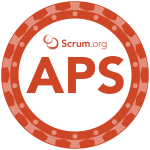Scrum Teams succeed best with a solid foundation. The Applying Professional Scrum (APS) course prepares individuals and teams to use Scrum effectively. The emphasis is on Scrum’s practical application.
APS exposes the common missteps in the adoption of Scrum. It increases the awareness of the associated symptoms, and provides guidance on how to address them.
The APS course is the perfect introduction to Scrum. This class lays the foundation for teams that need a flawless Scrum launch or that need to reboot Scrum. It also provides the foundation of knowledge needed for Product Owners, Scrum Masters and Developers.
The Applying Professional Scrum course is appropriate for anyone working on or with a Scrum Team, especially:
- Organizations or teams investigating Scrum
- Those currently struggling with Scrum, or
- Those beginning to utilize Scrum in their development environment.
The APS course is most effective as a training event for a dedicated team.
APS Syllabus
Students actively participate in the Scrum process with hands-on exercises that reinforce the learning points. Practicing Scrum helps in acquiring new skills, knowledge and theory.
Introducing Scrum and Agile
This module discusses the current state of Scrum. Topics include:
- The origins of Scrum
- Misconceptions of the Scrum framework
- The value that Scrum provides, and;
- An exploration of self-organization as a power tool for increasing productivity.
Scrum Planning
The course teaches practical techniques for:
- Planning releases
- Managing Product Backlogs
- Keeping Sprints on track, and;
- Maintaining healthy team behaviours.
This module equips teams to create and refine Backlog Items using proven techniques.
Keeping Scrum Healthy
This module focuses on common missteps teams make when adopting Scrum. It proposes strategies to avoid them. We discuss typical patterns/anti-patterns and students practice how to resolve them.
Getting Started
Teams can sometimes struggle implementing Scrum. The course addresses this and helps attendees plan and prepare to be effective with Scrum. This makes APS the true catalyst for change.
APS Assessment and Certification
Scrum.org certification requires a minimum score on a rigorous assessment. The APS course leads to the PSM I assessment. If you complete the Applying Professional Scrum course you will receive a link and password to take the PSM I assessment. Pass it and you’ll earn the “PSM I” certificate.
Course Prerequisites and Expectations of Students
Students will be able to make the most of their experience if they:
- Have read the Scrum Guide™ (required)
- Have worked with a project that builds or enhances a product
- Want to know more about how Scrum works, how to use it, and how it could help their team.
